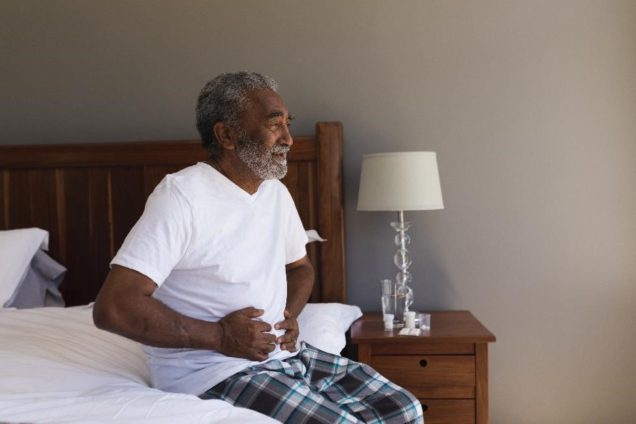A septuagenarian male came to the hospital looking unhappy with reddened eyes because he had had his sleep disturbed by incessant urination at night time (technically referred to as nocturia) over some months ago.
He continued to narrate his ordeal to me. “I frequently urinate more than my usual. Anytime I go to the washroom it takes about three to five seconds before the urine gushes out.”
He added that the urine stream divides into two like a dinner fork. More often than not, the stream of the urine halts for a second or two although I am not done peeing”.
So I asked him when it started and what he did about it? He said these symptoms started about five years ago but resorted to some herbs he patronized from a “trusted” source he met several years back on a VIP bus whom he claimed helped him regain his sexual stamina.
He pulled out a sample from his side pocket of his tie and dye shots. He said hwε, εno nie; meaning here you go, take a look at them. I smiled and soliloquized “these herbs did not work then.” Guess what, prostate cancer awareness month is September and as usual your healthy helper is here to give you tips.
What is prostate cancer?
According to Global Cancer Statistics (GLOBOCAN), prostate cancer is by far the second most common male malignancy following lung cancer with a percentage of up to 15% of all male cancers; meaning 1-2 males may have prostate cancer in their lifetime.
It is an abnormal growth of cells which have the growth exceeding that of normal prostate cells. The prostate is a reproductive organ in male that produces fluid that aids sperms to swim out freely during sexual arousal.
This organ is positioned in such a way that it surrounds the long tubes that transport urine from bladder. Therefore any disease causing an enlargement of this organ will compress and narrow the tube obstructing the flow of urine from the bladder.
What causes prostate cancer?
The cause of prostate cancer is unknown but risk factors do exist. Risk factors are not necessarily causes but their existence increase the risk of the disease.
They are categorised under two groups; definite risk factors and probable risk factors. Definite risk factors are those risk factors that have a strong association with the cancer.
These are advanced age (>65yrs), previous history of prostate cancer, nuclear family history and it can be genetically acquired.
Amongst all the definite risk factors, age is the strongest risk factor according to Dr. Matthew Kyei, a Ghanaian consultant urologist. After the age of 50, incidence and mortality due to prostate malignancies increases exponentially. Having a biological father or brother increases your chances of getting it. The risk is further increased if dad and brother both had it.
Also, having a prostate cancer before even if treated, can recur; about 20% to 30% chance according to a research by John Hopkins Medicine. The probable risk factors are smoking, increased fat intake and hormonal imbalance (increased testosterone levels; the male sex hormone).
What are the symptoms?
Will you believe that prostate cancer exist without any symptom at all (asymptomatic); totally unnoticed. A number of others show symptoms which include frequent urination that disturbs your daily activities; affecting your board meetings exceeding, the usual number of times you visit the lavatory in the past, the feeling of incomplete emptying of your bladder, urine wet underpants in between urinations, delay in initiating urination (about 2-3 seconds delay), leakage of urine after urination, dissection of urine stream like the tail (caudal fin) of fish etc. Having any of these extending for a month should prompt you to see the physician especially when you are above 50 years.
What can go wrong if you overlook these symptoms?
If the above symptoms are ignored, the long standing urinary problems from prostate cancer can lead to recurrent urinary tract infections and kidney shutdown. Also, the cancer cells that were previously localized to the prostate may move to the lower back (lower back pain and paralysis), lungs (chest pain), liver (jaundice) etc. which reduces survival even after treatment has been rendered.
What should I do to prevent prostate cancer?
Regular monitoring may help early decision, prevention of dreadful complications and treatment. The coexistence of a definite risk factor and any of the above symptoms that is persistent is good enough to be examined by an urologist or a GP to say the least.
Authorities encourage that two yearly prostate screening be done using Prostate Specific Antigen test. This is why routine and voluntary checkups are imperative so that asymptomatic and or early-stage cancers be timely found out for cheaper and less invasive treatment approaches.
Latest Stories
-
CHASS advises against reopening schools on Jan. 3 until financial arrears are cleared
7 minutes -
Newmont’s Akyem Vocational Institute unveils battery-powered fufu machine at graduation ceremony
11 minutes -
Newmont reinforces cultural heritage commitment in host communities
19 minutes -
Oti Region records over 10 road accident deaths from January to September this year
24 minutes -
Ecobank Ghana inaugurates ‘Ecobank Retirees Association’: A legacy of fellowship and service
30 minutes -
Optimal OMD appoints Taniya Mondal as MD
44 minutes -
Lekzy DeComic hailed for masterful emceeing at OB Amponsah’s comedy show
45 minutes -
Premier Care Hospital sparks joy with second annual nine lessons and carols night!
46 minutes -
OB Amponsah fills 4,000 capacity Bukom Boxing Arena with comedy special
50 minutes -
Bridging digital and human intellect: Africa’s Path from 4IR to 5IR
55 minutes -
How Newmont’s Learnership Programme empowered Dorcas Oppong to achieve her dreams
1 hour -
Kenya’s Ruto embraces rivals to shore up support
1 hour -
The student who blew whistle on Kenya airport controversy
1 hour -
PwC Ghana spreads festive cheer with inaugural Season of Smiles
1 hour -
CETAG threatens indefinite strike from Dec 31 over government’s ‘broken promises’
1 hour

